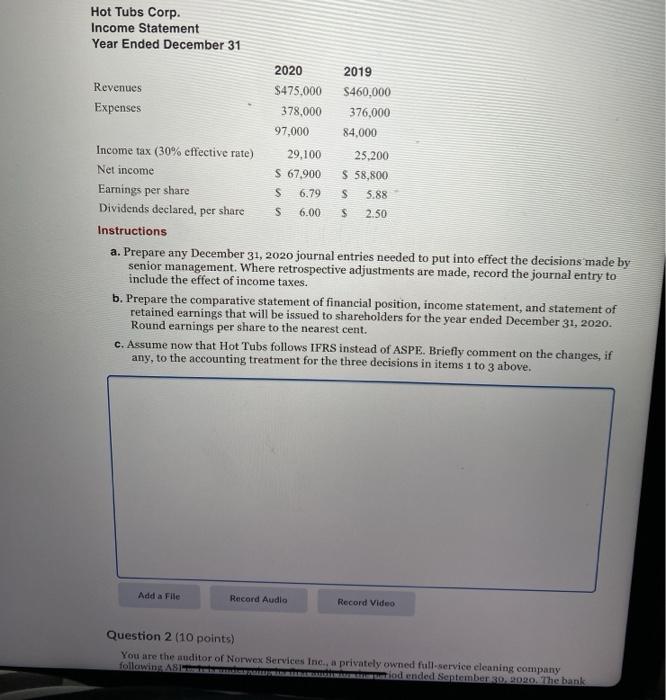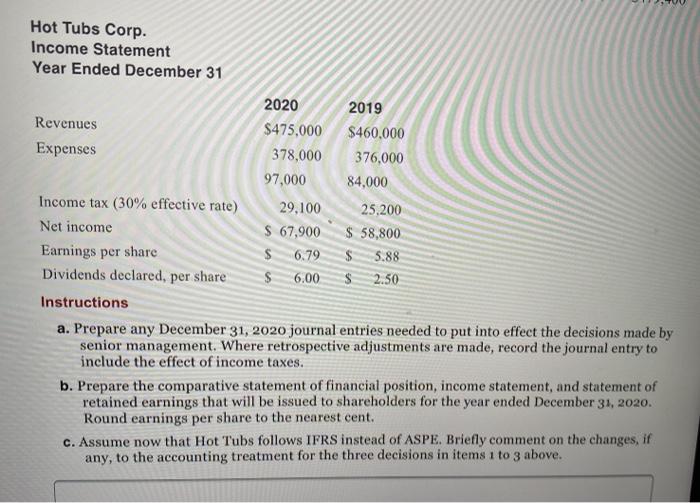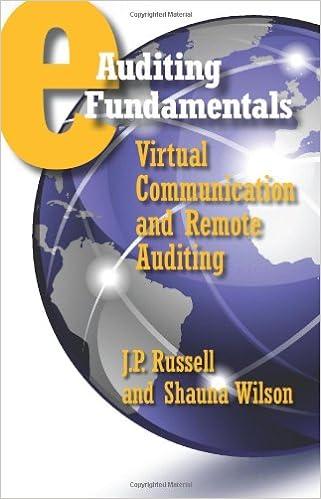can someone solve this.
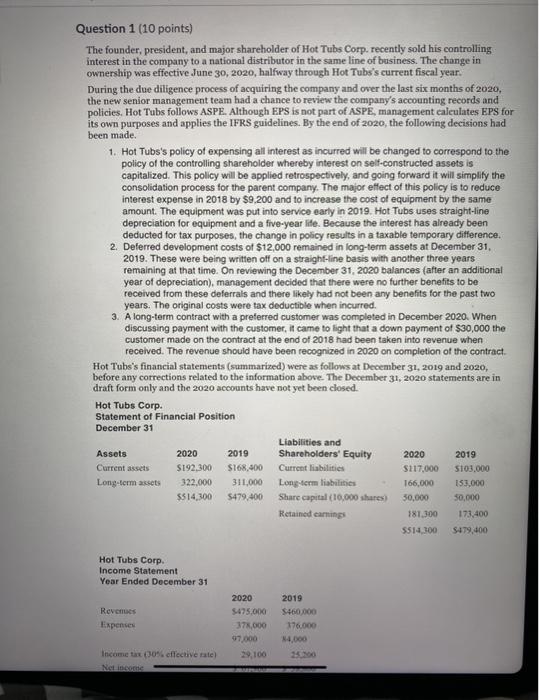
can someone solve this
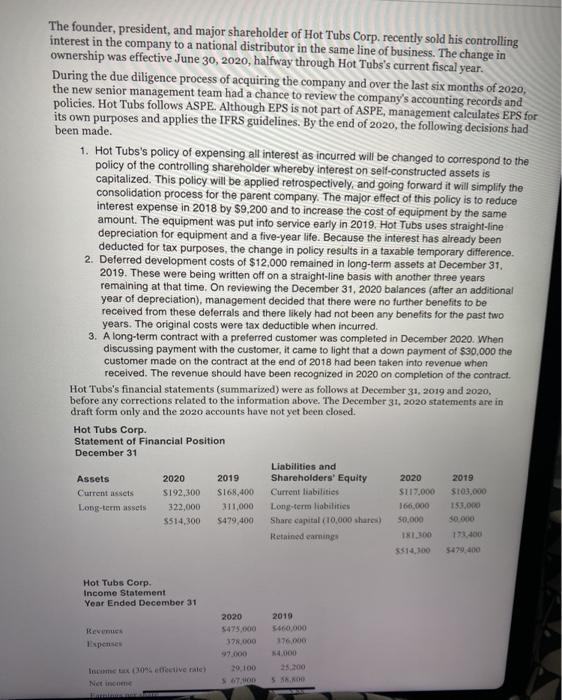
Question 1 (10 points) The founder, president, and major shareholder of Hot Tubs Corp. recently sold his controlling interest in the company to a national distributor in the same line of business. The change in ownership was effective June 30, 2020, halfway through Hot Tubs's current fiscal year. During the due diligence process of acquiring the company and over the last six months of 2020, the new senior management team had a chance to review the company's accounting records and policies. Hot Tubs follows ASPE. Although EPS is not part of ASPE, management calculates EPS for its own purposes and applies the IFRS guidelines. By the end of 2020, the following decisions had been made. 1. Hot Tubs's policy of expensing all interest as incurred will be changed to correspond to the policy of the controlling shareholder whereby interest on self-constructed assets is capitalized. This policy will be applied retrospectively, and going forward it will simplify the consolidation process for the parent company. The major effect of this policy is to reduce interest expense in 2018 by $9.200 and to increase the cost of equipment by the same amount. The equipment was put into service early in 2019. Hot Tubs uses straight-line depreciation for equipment and a five-year life. Because the interest has already been deducted for tax purposes, the change in policy results in a taxable temporary difference. 2. Deferred development costs of $12,000 remained in long-term assets at December 31. 2019. These were being written off on a straight-line basis with another three years remaining at that time. On reviewing the December 31, 2020 balances (after an additional year of depreciation), management decided that there were no further benefits to be received from these deferrals and there likely had not been any benefits for the past two years. The original costs were tax deductible when incurred. 3. A long-term contract with a preferred customer was completed in December 2020. When discussing payment with the customer, it came to light that a down payment of $30,000 the customer made on the contract at the end of 2018 had been taken into revenue when received. The revenue should have been recognized in 2020 on completion of the contract Hot Tubs's financial statements (summarized) were as follows at December 31, 2019 and 2020, before any corrections related to the information above. The December 31, 2020 statements are in draft form only and the 2020 accounts have not yet been closed. Hot Tubs Corp. Statement of Financial Position December 31 Liabilities and Assets 2020 2019 Shareholders' Equity 2020 2019 Current assets S192,300 $168.400 Current liabilities $117,000 5103.000 Long-term assets 322,000 311,000 Long-term liabilities 166,000 133.000 $314.300 $479,400 Share capital (10,000 shares) 30,000 50,000 Retained earnings 381.300 173.400 5514300 $479,400 Hot Tubs Corp. Income Statement Year Ended December 31 Reves Expenses 2020 $475,000 378,000 97.000 2019 $460.000 176.000 14,000 Income tax (0%. effective rate) Netics Hot Tubs Corp. Income Statement Year Ended December 31 2020 2019 Revenues $475,000 S460,000 Expenses 378,000 376,000 97,000 84,000 Income tax (30% effective rate) 29,100 25,200 Net income S 67.900 $ 58,800 Earnings per share s 6.79 S 5.88 Dividends declared, per share S 6.00 5 2.50 Instructions a. Prepare any December 31, 2020 journal entries needed to put into effect the decisions made by senior management. Where retrospective adjustments are made, record the journal entry to include the effect of income taxes. b. Prepare the comparative statement of financial position, income statement, and statement of retained earnings that will be issued to shareholders for the year ended December 31, 2020. Round earnings per share to the nearest cent. c. Assume now that Hot Tubs follows IFRS instead of ASPE. Briefly comment on the changes, if any, to the accounting treatment for the three decisions in items 1 to 3 above. Add a File Record Audio Record Video Question 2 (10 points) You are the auditor of Norwex Services Inc., a privately owned full-service cleaning company following AS Miod ended September, 20RO The bank The founder, president, and major shareholder of Hot Tubs Corp. recently sold his controlling interest in the company to a national distributor in the same line of business. The change in ownership was effective June 30, 2020, halfway through Hot Tubs's current fiscal year. During the due diligence process of acquiring the company and over the last six months of 2020, the new senior management team had a chance to review the company's accounting records and policies. Hot Tubs follows ASPE. Although EPS is not part of ASPE, management calculates EPS for its own purposes and applies the IFRS guidelines. By the end of 2020, the following decisions had been made. 1. Hot Tubs's policy of expensing all interest as incurred will be changed to correspond to the policy of the controlling shareholder whereby interest on self-constructed assets is capitalized. This policy will be applied retrospectively, and going forward it will simplify the consolidation process for the parent company. The major effect of this policy is to reduce interest expense in 2018 by $9,200 and to increase the cost of equipment by the same amount. The equipment was put into service early in 2019. Hot Tubs uses straight-line depreciation for equipment and a five-year life. Because the interest has already been deducted for tax purposes, the change in policy results in a taxable temporary difference. 2. Deferred development costs of $12,000 remained in long-term assets at December 31. 2019. These were being written off on a straight-line basis with another three years remaining at that time. On reviewing the December 31, 2020 balances (after an additional year of depreciation), management decided that there were no further benefits to be received from these deferrals and there likely had not been any benefits for the past two years. The original costs were tax deductible when incurred. 3. A long-term contract with a preferred customer was completed in December 2020. When discussing payment with the customer, it came to light that a down payment of $30,000 the customer made on the contract at the end of 2018 had been taken into revenue when received. The revenue should have been recognized in 2020 on completion of the contract. Hot Tubs's financial statements (summarized) were as follows at December 31, 2019 and 2020. before any corrections related to the information above. The December 31, 2020 statements are in draft form only and the 2020 accounts have not yet been closed. Hot Tubs Corp. Statement of Financial Position December 31 Liabilities and 2020 Shareholders' Equity 2019 Current assets 8192,300 $168,400 Current liabilities ST17,000 S103.000 Long-term assets 322,000 311,000 Long-term libilities 166,000 5514,300 S479 400 Share capital (10,000 shares) 50,000 Retained earnings $479,400 Assets 2019 2020 153,00 0 000 T100 $$14,100 Hot Tubs Corp. Income Statement Year Ended December 31 REVUES 2020 5475.000 378.00 2019 5460,000 176.00 4.000 25200 5 MACHO Inex 304 ctive rate Notice 29 100 OTOD Hot Tubs Corp. Income Statement Year Ended December 31 2020 2019 Revenues $475,000 $460.000 Expenses 378,000 376,000 97,000 84,000 Income tax (30% effective rate) 29,100 25,200 Net income $ 67,900 $ 58,800 Earnings per share $ 6.79 $ 5.88 Dividends declared, per share $ 6.00 $ 2.50 Instructions a. Prepare any December 31, 2020 journal entries needed to put into effect the decisions made by senior management. Where retrospective adjustments are made, record the journal entry to include the effect of income taxes. b. Prepare the comparative statement of financial position, income statement, and statement of retained earnings that will be issued to shareholders for the year ended December 31, 2020. Round earnings per share to the nearest cent. C. Assume now that Hot Tubs follows IFRS instead of ASPE. Briefly comment on the changes, if any, to the accounting treatment for the three decisions in items 1 to 3 above. Question 1 (10 points) The founder, president, and major shareholder of Hot Tubs Corp. recently sold his controlling interest in the company to a national distributor in the same line of business. The change in ownership was effective June 30, 2020, halfway through Hot Tubs's current fiscal year. During the due diligence process of acquiring the company and over the last six months of 2020, the new senior management team had a chance to review the company's accounting records and policies. Hot Tubs follows ASPE. Although EPS is not part of ASPE, management calculates EPS for its own purposes and applies the IFRS guidelines. By the end of 2020, the following decisions had been made. 1. Hot Tubs's policy of expensing all interest as incurred will be changed to correspond to the policy of the controlling shareholder whereby interest on self-constructed assets is capitalized. This policy will be applied retrospectively, and going forward it will simplify the consolidation process for the parent company. The major effect of this policy is to reduce interest expense in 2018 by $9.200 and to increase the cost of equipment by the same amount. The equipment was put into service early in 2019. Hot Tubs uses straight-line depreciation for equipment and a five-year life. Because the interest has already been deducted for tax purposes, the change in policy results in a taxable temporary difference. 2. Deferred development costs of $12,000 remained in long-term assets at December 31. 2019. These were being written off on a straight-line basis with another three years remaining at that time. On reviewing the December 31, 2020 balances (after an additional year of depreciation), management decided that there were no further benefits to be received from these deferrals and there likely had not been any benefits for the past two years. The original costs were tax deductible when incurred. 3. A long-term contract with a preferred customer was completed in December 2020. When discussing payment with the customer, it came to light that a down payment of $30,000 the customer made on the contract at the end of 2018 had been taken into revenue when received. The revenue should have been recognized in 2020 on completion of the contract Hot Tubs's financial statements (summarized) were as follows at December 31, 2019 and 2020, before any corrections related to the information above. The December 31, 2020 statements are in draft form only and the 2020 accounts have not yet been closed. Hot Tubs Corp. Statement of Financial Position December 31 Liabilities and Assets 2020 2019 Shareholders' Equity 2020 2019 Current assets S192,300 $168.400 Current liabilities $117,000 5103.000 Long-term assets 322,000 311,000 Long-term liabilities 166,000 133.000 $314.300 $479,400 Share capital (10,000 shares) 30,000 50,000 Retained earnings 381.300 173.400 5514300 $479,400 Hot Tubs Corp. Income Statement Year Ended December 31 Reves Expenses 2020 $475,000 378,000 97.000 2019 $460.000 176.000 14,000 Income tax (0%. effective rate) Netics Hot Tubs Corp. Income Statement Year Ended December 31 2020 2019 Revenues $475,000 S460,000 Expenses 378,000 376,000 97,000 84,000 Income tax (30% effective rate) 29,100 25,200 Net income S 67.900 $ 58,800 Earnings per share s 6.79 S 5.88 Dividends declared, per share S 6.00 5 2.50 Instructions a. Prepare any December 31, 2020 journal entries needed to put into effect the decisions made by senior management. Where retrospective adjustments are made, record the journal entry to include the effect of income taxes. b. Prepare the comparative statement of financial position, income statement, and statement of retained earnings that will be issued to shareholders for the year ended December 31, 2020. Round earnings per share to the nearest cent. c. Assume now that Hot Tubs follows IFRS instead of ASPE. Briefly comment on the changes, if any, to the accounting treatment for the three decisions in items 1 to 3 above. Add a File Record Audio Record Video Question 2 (10 points) You are the auditor of Norwex Services Inc., a privately owned full-service cleaning company following AS Miod ended September, 20RO The bank The founder, president, and major shareholder of Hot Tubs Corp. recently sold his controlling interest in the company to a national distributor in the same line of business. The change in ownership was effective June 30, 2020, halfway through Hot Tubs's current fiscal year. During the due diligence process of acquiring the company and over the last six months of 2020, the new senior management team had a chance to review the company's accounting records and policies. Hot Tubs follows ASPE. Although EPS is not part of ASPE, management calculates EPS for its own purposes and applies the IFRS guidelines. By the end of 2020, the following decisions had been made. 1. Hot Tubs's policy of expensing all interest as incurred will be changed to correspond to the policy of the controlling shareholder whereby interest on self-constructed assets is capitalized. This policy will be applied retrospectively, and going forward it will simplify the consolidation process for the parent company. The major effect of this policy is to reduce interest expense in 2018 by $9,200 and to increase the cost of equipment by the same amount. The equipment was put into service early in 2019. Hot Tubs uses straight-line depreciation for equipment and a five-year life. Because the interest has already been deducted for tax purposes, the change in policy results in a taxable temporary difference. 2. Deferred development costs of $12,000 remained in long-term assets at December 31. 2019. These were being written off on a straight-line basis with another three years remaining at that time. On reviewing the December 31, 2020 balances (after an additional year of depreciation), management decided that there were no further benefits to be received from these deferrals and there likely had not been any benefits for the past two years. The original costs were tax deductible when incurred. 3. A long-term contract with a preferred customer was completed in December 2020. When discussing payment with the customer, it came to light that a down payment of $30,000 the customer made on the contract at the end of 2018 had been taken into revenue when received. The revenue should have been recognized in 2020 on completion of the contract. Hot Tubs's financial statements (summarized) were as follows at December 31, 2019 and 2020. before any corrections related to the information above. The December 31, 2020 statements are in draft form only and the 2020 accounts have not yet been closed. Hot Tubs Corp. Statement of Financial Position December 31 Liabilities and 2020 Shareholders' Equity 2019 Current assets 8192,300 $168,400 Current liabilities ST17,000 S103.000 Long-term assets 322,000 311,000 Long-term libilities 166,000 5514,300 S479 400 Share capital (10,000 shares) 50,000 Retained earnings $479,400 Assets 2019 2020 153,00 0 000 T100 $$14,100 Hot Tubs Corp. Income Statement Year Ended December 31 REVUES 2020 5475.000 378.00 2019 5460,000 176.00 4.000 25200 5 MACHO Inex 304 ctive rate Notice 29 100 OTOD Hot Tubs Corp. Income Statement Year Ended December 31 2020 2019 Revenues $475,000 $460.000 Expenses 378,000 376,000 97,000 84,000 Income tax (30% effective rate) 29,100 25,200 Net income $ 67,900 $ 58,800 Earnings per share $ 6.79 $ 5.88 Dividends declared, per share $ 6.00 $ 2.50 Instructions a. Prepare any December 31, 2020 journal entries needed to put into effect the decisions made by senior management. Where retrospective adjustments are made, record the journal entry to include the effect of income taxes. b. Prepare the comparative statement of financial position, income statement, and statement of retained earnings that will be issued to shareholders for the year ended December 31, 2020. Round earnings per share to the nearest cent. C. Assume now that Hot Tubs follows IFRS instead of ASPE. Briefly comment on the changes, if any, to the accounting treatment for the three decisions in items 1 to 3 above


